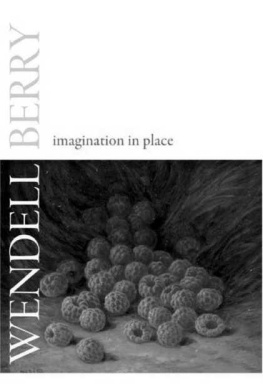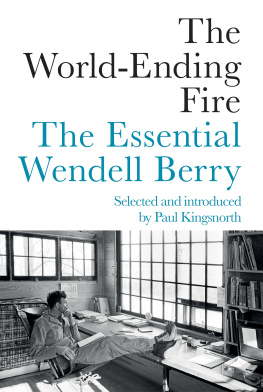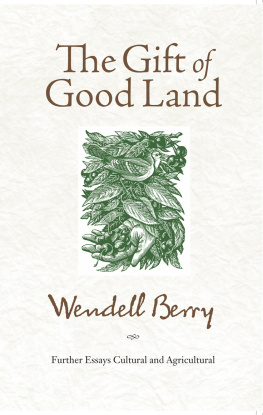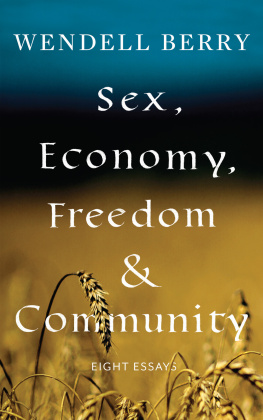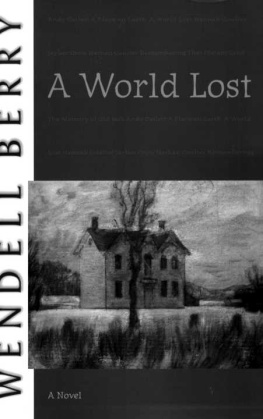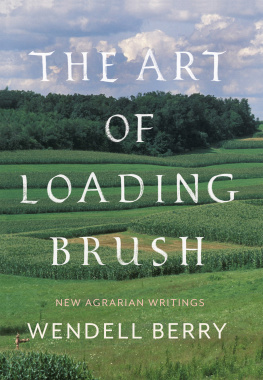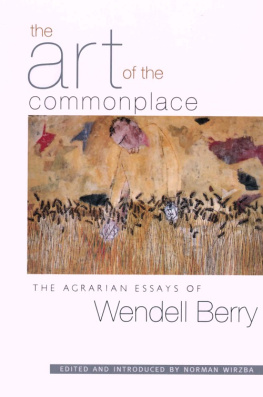Other Books of Essays by Wendell Berry
Another Turn of the Crank
The Art of the Commonplace
Bringing it to the Table
Citizenship Papers
A Continuous Harmony
The Gift of Good Land
Harlan Hubbard: Life and Work
The Hidden Wound
Home Economics
Life Is a Miracle
Long-Legged House
Recollected Essays: 196s-198o
Sex, Economy, Freedom and Community
Standing by Words
The Unforeseen Wilderness
The Unsettling ofAmerica
The Way of Ignorance
What Are People For?
WENDELL BERRY






i
(z.oo4)
By an interworking of chance and choice, I have happened to live nearly all my life in a place I don't remember not knowing. Most of my forebears for the last two hundred years could have said the same thing. I was born to people who knew this place intimately, and I grew up knowing it intimately. For a long time the intimacy was not very conscious, but I certainly did not grow up here thinking of the place as "subject matter," and I have never thought of it in that way. I have not lived here, or worked with my neighbors and my family, or listened to the storytellers and the rememberers, in order to be a writer. The place is precedent to my work, especially my fiction, and is, as I shall try to show, inevitably different from it.
By the same interworking of chance and choice, though somewhat expectably, I have lived here as a farmer. Except for one great-grandfather, all of my family that I know about have been farming people, and I grew up under instruction, principally from my father but also from others, to learn farming, to know the difference between good farming and bad, to regard the land as of ultimate value, and to admire and respect those who farmed well. I never heard a farmer spoken of as "just a farmer" or a farm woman as "just a housewife." To my father and his father especially, the knowledge of land and of farming was paramount. They thought the difference between a good farmer and a bad one was just as critical as the difference between a good politician and a bad one.

In 1964, after several years of wandering about, my wife Tanya and I returned to Kentucky with our two children and bought the property known as Lanes Landing, on the Kentucky River, about a mile from the house where my mother was born and raised and about five miles from my father's home place. The next summer we fixed up the house and moved in. We have been here ever since. Or Tanya and I have; our children are farming nearby.
Before we moved here, I had known this place for thirty-one years, and we have now lived here for thirty-nine. We raised our children here. We have taken from this place most of our food, much of our fuel, and always, despite the difficulties and frustrations of a farming life, a sustaining pleasure. Also, nearly everything I have written has been written here. When I am asked how all this fits together, I have to say, "Awkwardly." Even so, this has been the place of my work and of my life.
This essay is most immediately obstructed by the difficulty of separating my work from my life, and the place from either. The place included in some of my work is also the place that has included me as a farmer and as a writer.
In the course of my life and of my work as a farmer, I have come to know familiarly two small country towns and about a dozen farms. That is, I have come to know them well enough at one time or another that I can shut my eyes and see them as they were, just as I can see them now as they are. The most intimate "world" of my life is thus a small one. The most intimate "world" of my fiction is even smaller: a town of about a hundred people, "Port William:' and a few farms in its neighborhood. Between these two worlds, the experienced and the imagined, there is certainly a relationship. But it is a relationship obscure enough as it is, and easy to obscure further by oversimplification. Another difficulty of this essay is the temptation to oversimplify.
As a lot of writers must know, it is easy for one's family or neighbors to identify fictional characters with actual people. A lot of writers must know too that these identifications are sometimes astonishingly wrong, and are always at least a little wrong. The inevitability of this sort of error is explainable, and it is significant.
Some of my own fiction has seemed to me to be almost entirely imagined. Some of it has drawn maybe as close as possible to actual experience. The writing has sometimes grown out of a long effort to come to terms with an actual experience. But one must not be misled by the claims of "realism." There is, true enough, a kind of writing that has an obligation to tell the truth about actual experience, and therefore it is obliged to accept the limits of what is actually or provably known. But works of imagination come of an impulse to transcend the limits of experience or provable knowledge in order to make a thing that is whole. No human work can become whole by including everything, but it can become whole in another way: by accepting its formal limits and then answering within those limits all the questions it raises. Any reasonably literate reader can understand Homer without the benefit of archaeology, or Shakespeare without resort to his literary sources.
It seems to me that my effort to come to terms in writing with an actual experience has been, every time, an effort to imagine the experience, to see it clear and whole in the mind's eye. One might suppose, reasonably enough, that this could be accomplished by describing accurately what one actually knows from records of some sort or from memory. But this, I believe, is wrong. What one actually or provably knows about an actual experience is never complete; it cannot, within the limits of memory or factual records, be made whole. Imagination "completes the picture" by transcending the actual memories and provable facts. For this reason, I have often begun with an actual experience and in the end produced what I have had to call a fiction. In the effort to tell a whole story, to see it whole and clear, I have had to imagine more than I have known. "There's no use in telling a pretty good story when you can tell a really good one:' my mother's father told me once. In saying so, he acknowledged both a human limit and a human power, as well as his considerable amusement at both.

